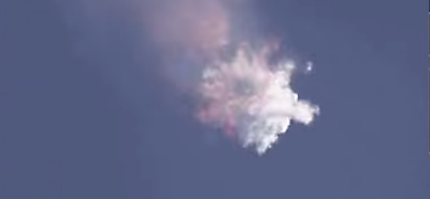Will SpaceX explosion impact Air Force launch competitions?
The company recently was green-lighted to compete for future launches of military satellites.

The Falcon 9 exploded a little over two minutes after liftoff.
The explosion Sunday of a Space X Falcon 9 rocket shortly after liftoff directly affected NASA and a resupply mission to the International Space Station, but its aftershocks could affect the military’s plans for future launches of its spy satellites.
The rocket, carrying a Dragon capsule loaded with food, water and other supplies (including a Microsoft HoloLens) exploded 2 minutes, 19 seconds after taking off from Cape Canaveral. SpaceX and the Federal Aviation Administration are investigating the cause, which so far has only been attributed to a failure in the rocket’s upper stage.
SpaceX, founded by tech entrepreneur Elon Musk, recently gained certification from the Air Force to compete for future launch contracts under the Evolved Expendable Launch Vehicle program, after a sometimes contentious process that included SpaceX filing suit over the Air Force’s $11 billion, sole-source EELV contract with United Launch Alliance.
ULA, a joint venture of Boeing and Lockheed Martin, had enjoyed a virtual monopoly on Air Force launches until SpaceX came along and contended that it could launch the military’s satellites for less than the Air Force pays ULA. SpaceX filed suit in 2014 in response to the ULA contract, but withdrew it in January after the Air Force promised that it could compete for future contracts once it completed the certification process.
How Sunday’s explosion will impact SpaceX’s standing in future competitions is yet to be seen, but the Air Force will surely be interested in knowing the cause and whether it can be reliably fixed. The Falcon 9 had already flown 18 missions overall, six of them for NASA, without incident. The last time the company had a failure was in 2008, when a Falcon 1 rocket failed to reach orbit. ULA, for its part, has not had a failure with its Atlas V or Delta IV rockets.
During the National Space Symposium in April, Gen. John Hyten, the head of Air Force Space Command, said a plan to handle launch failures when working with competing commercial providers hadn’t been worked out, but he acknowledged it is a concern, Defense News reported. “I'm not going to stand up and put a billion dollar satellite on top of a rocket I don't know is going to work," Hyten, said.
To judge from NASA’s example, a failure such as Sunday’s would put a company in a bind. The SpaceX explosion was the third for ISS missions in less than a year. In October 2014, an Orbital Sciences rocket headed for the space station exploded just after liftoff. The explosion was blamed on a fuel pump in the rocket’s Russian-made engine, and although Orbital Sciences has redesigned the engine, it won’t be able to make another launch until sometime in 2016, the Los Angeles Times reported.
Another ISS resupply mission, launched by Russia, failed in April when the rocket spun out of control and crashed.




